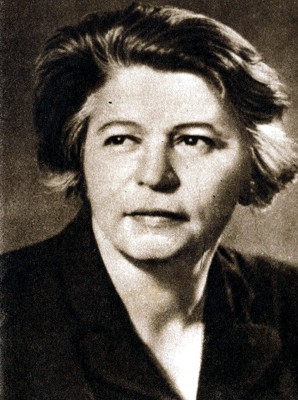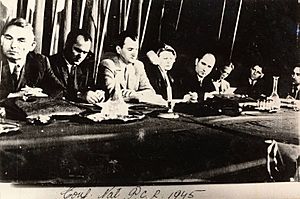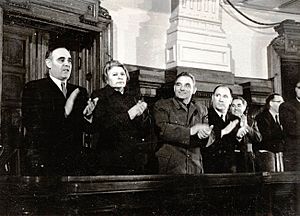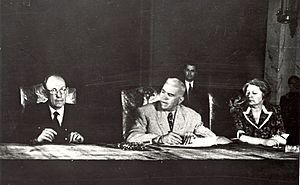Ana Pauker facts for kids
Quick facts for kids
Ana Pauker
|
|
|---|---|
 |
|
| Minister of Foreign Affairs | |
| In office 30 December 1947 – 9 July 1952 |
|
| President | Constantin Ion Parhon Petru Groza |
| Prime Minister | Petru Groza Gheorghe Gheorghiu-Dej |
| Preceded by | Gheorghe Tătărescu |
| Succeeded by | Simion Bughici |
| Personal details | |
| Born |
Hannah Rabinsohn
13 December 1893 Codăești, Vaslui County, Kingdom of Romania |
| Died | 3 June 1960 (aged 66) Bucharest, People's Republic of Romania |
| Political party | Romanian Communist Party |
| Other political affiliations |
Social Democratic Party of Romania Socialist Party of Romania |
| Spouse | Marcel Pauker |
| Domestic partner | Eugen Fried |
| Children | Tanio, Vlad, Tatiana, Masha (Maria), Alexandru (adopted) |
| Residences | Bucharest, Switzerland, Paris, Berlin, Vienna, Moscow |
| Occupation | Communist activist |
| Profession | Teacher |
| Parents | Sarah and (Tsvi-)Hersh Kaufman Rabinsohn |
Ana Pauker (born Hannah Rabinsohn; 13 February 1893 – 3 June 1960) was an important communist leader in Romania. She served as the country's foreign minister from the late 1940s to the early 1950s. When she took office in December 1947, Ana Pauker became the first woman in the world to be a foreign minister. After World War II, she was also seen as the unofficial leader of the Romanian Communist Party.
Contents
Ana Pauker's Life Story
Early Life and Political Beginnings
Ana Pauker was born into a poor, religious Jewish family in Codăești, Vaslui County, Romania. Her parents were Sarah and Hersh Kaufman Rabinsohn. Her father worked for the synagogue, and her mother sold food. Ana was one of four children who survived; two others died when they were babies.
As a young woman, she became a teacher in a Jewish elementary school in Bucharest. While her younger brother was a Zionist (someone who supported a Jewish homeland) and stayed religious, Ana chose to get involved in politics. She joined the Social Democratic Party of Romania in 1915. Later, in 1918, she joined its new version, the Socialist Party of Romania.
Ana was very active in the group that supported the Bolshevik movement. This group took control of the party in May 1921 and joined the Comintern, an international communist organization. The party then became known as the Socialist-Communist Party (which later became the Communist Party of Romania). Ana and her husband, Marcel Pauker, became important members. They were arrested in 1923 and 1924 for their political work. Because of this, they went to live in other countries like Berlin, Paris, and Vienna in 1926 and 1927.
In 1928, Ana Pauker moved to Moscow to study at the Comintern's International Lenin School. This school trained top leaders for the Communist movement. There, she became close with Dmitry Manuilsky, a key representative for the Kremlin (the Soviet government) in the 1930s.
Becoming a Communist Leader
Ana Pauker went to France, where she taught for the Comintern. She also worked with the communist movement in other parts of the Balkans. When she returned to Romania in 1935, she was arrested and injured while trying to escape. Ana Pauker was the main person on trial in a well-known case with other communist leaders. She was sentenced to ten years in prison.
In May 1941, the Romanian government sent her to live in the Soviet Union. This was part of an exchange for Ion Codreanu, a former member of a Bessarabian parliament, who had been held by the Soviets. Meanwhile, her husband had been a victim of the Soviet Great Purge in 1938, a time when many people were arrested or killed for political reasons. Some rumors said she had accused him of being a traitor. However, old documents show that she refused to do so many times.

In Moscow, Ana Pauker became the leader of Romanian communists who were living in exile. They were known as the "Muscovite faction." She returned to Romania in 1944 when the Red Army (Soviet army) entered the country. She became a member of the government after the war, which was mostly controlled by communists. In November 1947, the foreign minister, Gheorghe Tătărescu, was removed, and Pauker took his place. This made her the first woman in modern history to hold such a position.
However, her role in the Communist Party leadership was even more important. She chose not to become the General Secretary of the Romanian Communist Party. She felt that a Romanian worker, Gheorghe Gheorghiu-Dej, should have the job instead of her, an intellectual woman. Still, Pauker was officially the second-highest leader in the Party. She was also one of the four members of the Central Committee's Secretariat.
Ana Pauker was called "arguably the Jewish woman who achieved the most political power in the 20th century." Many believed she was the real leader of the Romanian communists right after the war. In 1948, Time magazine put her picture on its cover and called her "the most powerful woman alive." She was known as the "Iron Lady" of Romanian Communist politics. People widely saw her as a strong supporter of Stalinism (Stalin's policies) and as Moscow's main agent in Romania.
Ana Pauker played a key role in bringing communism to Romania. Yet, she also tried to be more moderate within the Romanian communist leadership after the war. She was involved in the arrests of many Romanians linked to the fascist Ion Antonescu government in 1945. But by August 1945, Pauker and interior minister Teohari Georgescu released most of those arrested. They even offered forgiveness to members of the fascist Iron Guard who had not committed serious crimes and would give up their weapons.
In late 1944 or early 1945, she wanted to form a broader government with other parties. But Joseph Stalin disagreed. So, the Communist-led government formed in March 1945 included a smaller group of parties.
During this time, Pauker also allowed many new members to join the Communist Party, even former members of the Iron Guard. This policy was later criticized. Many of these new members were removed from the party between 1948 and 1950. Also, many arrests returned in 1947, including members of other political parties. Although she followed Soviet orders to arrest leaders of the non-communist opposition, Pauker reportedly opposed the arrests of important officials like Corneliu Coposu. She also asked for a lighter sentence for Iuliu Maniu, a leader of another party.
Historian Norman Naimark noted that Pauker's policies from 1945 to 1948 were similar to those of Polish leader Władysław Gomułka. She supported working with other parties and tried to protect social democrats and liberals.
These differences became stronger as the government became more like Stalin's under Cold War pressures from 1947 onwards. Ana Pauker was a strong supporter of Stalin and the Soviet Union. She once said that if a Soviet official told her something, it was like a holy truth to her. She would do anything if they said the USSR needed it.
However, Pauker also supported some policies that went against the Kremlin's wishes during the "high Stalinism" period. In 1948, she opposed checking and removing the many new members who joined the Communist Party, even though the Cominform (a Soviet-led organization) had ordered it. In 1949, she opposed building the Danube-Black Sea Canal, even though Joseph Stalin himself had suggested it. From 1949 to 1952, she opposed removing Romanian veterans of the Spanish Civil War and French Resistance. She was also accused of delaying investigations in the case of Justice Minister Lucrețiu Pătrășcanu.
Additionally, Pauker helped about 100,000 Jewish people move to Israel from 1950 to 1952. This was at a time when other Soviet-controlled countries had stopped Jewish emigration. She also strongly opposed forced collectivization (when the government takes over private farms) in the summer of 1950. She was in a hospital in Moscow for cancer treatment at the time. She called such actions "absolutely against the party's ideas." She allowed farmers who were forced into collective farms to return to private farming. She also stopped further collectivization throughout 1951. This, along with her support for higher prices for farm products, led Stalin to say that Pauker had moved away from Marxist policies.
Pauker's "Moscow faction" (named because many members had lived in Moscow) was opposed by the "prison faction." Gheorghe Gheorghiu-Dej, the leader of the "prison faction," supported more intense collectivization and was a strict Stalinist. However, he did not like some Soviet influences.
Her Downfall

Gheorghiu-Dej used the prejudice against Jewish people in Stalin's policies to his advantage. He asked Stalin to take action against Pauker and her allies. Gheorghiu-Dej went to Moscow in August 1951 to get Stalin's approval to remove Pauker and her friends from power. Historian Vladimir Tismăneanu says that Ana Pauker's downfall happened mainly because Stalin decided to start a big political removal in Romania. Pauker, Vasile Luca, and Teohari Georgescu were removed from their positions in May 1952. This helped Gheorghiu-Dej gain more control over the country and the Party.
The accusations against Ana Pauker increasingly focused on her views about Zionism and Israel. She was accused of supporting "spying activities of the Israeli Legation" and of having a "nationalist attitude on the emigration of Jews to Israel."
Pauker was arrested on 18 February 1953. She was questioned intensely and treated harshly to prepare for a public trial, similar to what happened in other countries. After Stalin died in March 1953, she was released from jail and put under house arrest. This happened because Vyacheslav Molotov intervened, reportedly at the request of his wife Polina Zhemchuzhina, who was a friend of Pauker's. When another Party leader told Pauker about Stalin's death, she cried. Her colleague then joked, "Don't cry. If Stalin were still alive, you'd be dead."
After a big Party meeting in Moscow in 1956, some feared that the new Soviet leader, Nikita Khrushchev, might force the Romanian Party to bring Pauker back into power. Gheorghiu-Dej then accused her, Vasile Luca, and Teohari Georgescu of being too extreme in the late 1940s and early 1950s. The time when these four leaders were in power saw political persecution and harsh treatment of opponents, such as at Pitești prison. Gheorghiu-Dej, who was also responsible for many of these actions, used these moments to keep his own policies in place after Stalin's death.
Later Years and Legacy
In 1956, a high-level party group questioned her. They wanted her to admit she was guilty. Again, she said she was innocent and asked to be allowed back into the party, but she was not successful.
During her forced retirement, Pauker was allowed to work as a translator for a publishing house, translating from French and German.
In the spring of 1959, doctors found that her cancer had returned and was very serious. She died on 3 June 1960 from heart failure, after the cancer had spread to her heart and lungs.
Ana Pauker's legacy in Romania is still affected by how the ruling party unfairly blamed her for the problems of the early Communist period in the 1950s and 1960s. For example, she is often called "Stalin with a skirt" in Romania. Film director Radu Gabrea, who made a documentary about Pauker, believes that this negative image of Pauker is partly because she was a woman and Jewish, and it shows the widespread prejudice against Jewish people in Romania. Today, in the Ministry of Foreign Affairs of Romania, Pauker's picture is the only one that has been removed from the gallery of former Ministers of Foreign Affairs.
Historian Robert Levy said that Ana Pauker was long blamed for all the terrible things that happened during the Stalinist period. She is still criticized in Romania today as the leader most responsible for the harsh rule after the war. But the truth is that this complex figure, even though she was a Stalinist and helped bring Communism to Romania, also surprisingly offered a different, less harsh way of doing things. Her fall from power meant that no reform-minded leader could succeed in Romania. This led to extreme hardship for its citizens, which reached its peak under the Ceaușescu government.
Family Life
Marcel and Ana Pauker had three children:
- Tanio (born 1921, died 1922);
- Vlad (born 1926, died 2016);
- Tatiana (born 1928, died 2011).
It was often said that she accused the father of her three children of being a "Trotskyite" (someone with different political views). However, old documents show that she repeatedly refused to do so.
Ana Pauker had a fourth child, Masha (born 1932, died 2020). Her father was the Czech-Jewish Communist Eugen Fried. Masha (Maria) was born in Moscow and raised in France by her father. Pauker adopted a fifth child, Alexandru, in the late 1940s.
See also
 In Spanish: Ana Pauker para niños
In Spanish: Ana Pauker para niños


